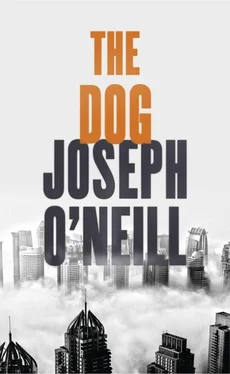‘Look, I can’t skip town,’ I tell him. ‘It’s a question of principle.’
Ollie takes a swig of pineapple juice and clatters his glass on the table. ‘Fair enough,’ he says. ‘I won’t be around to see it all go down, unfortunately.’
A cold, cold chill. ‘Shanghai?’ Why is this word, Shanghai, in my life?
‘Yeah,’ Ollie says. He tells me that they’ve found a great pre-school for Charlie, and an apartment that’s ‘smallish, but fantastic. We’re even shipping out Walda, the nanny.’ Ollie says that he’s started to get excited, and I believe him. He’s already calling it ‘Shangers’.
‘Sweet,’ I say.
A little while later, we part company. The world goes on. It doesn’t care — unless it has you in its sights.
I have long had my suspicions about the escape to figuration — the flight to metamorphic representation of which I’m so often guilty. How can A be turned into B? Doesn’t A = A? Isn’t B really a way to hide A? Yet I’m also aware that the great personages of the history of thinking, to whom I owe my small measure of liberty from ignorance, have seen fit to deploy apparent misrepresentations in order to progress into the unknown. It’s in the spirit of the doomed, last-ditch sortie that I embrace the idea of the submarine to attempt to account for the deep element of illusion into which, it feels like, I have been hurled, as if — and here one definitively leaves behind the stockade of the literal — as if at some point in one’s past one was thrown unconscious overboard, and one has only now gained an awareness of one’s situation, which is that of the human person going downward in water, and one is in a fix, to put it mildly, and heedless fish-people swim by, and a terrible bathyal reality prevails, and one can only go down, and cannot breathe, and one’s humanness has no medium. The perils of such a fantasia are evident — what about people who have actually been thrown overboard, for example? Is their experience to be frivolously appropriated? Nonetheless, once I’m restored from my aquatic delirium, I’m left with a new, possibly valuable, clue-like question: when was I tossed into the sea? Because, as I review my history of living without a feeling of insight, I cannot say that it all started yesterday, at Dubai International Airport. I have trouble identifying a moment, if I may flip the question, about which I can say, At that moment, I certainly had not yet gone under; at that moment, I was on the good ship. Indeed it seems to me that every epoch of my life has involved a snorkeller of sorts, a gasper … O brightening glance! There must be a way to Wiki this. There must be an answer.
I go to sleep. When I stir, at dawn in The Situation, nothing has changed. The facts are all still there. Tomorrow is not a new day.
Except that sometimes the details are new. Today’s new detail is Watson. Watson is the most trusted and put-upon Batros lawyer in Dubai, and all of our dealings have been pleasant and successful. I would not go so far as to call him a friend, but I will say that I like and respect him and have reason to hope he feels the same way about me. ‘Good morning,’ he says on the intercom, ‘I was wondering if I might come up. I’ve got some paperwork here, I’m afraid.’
‘Of course,’ I say.
Watson accepts coffee. He asks for permission to sit at the table, and he waits for me to join him before he reaches for his briefcase, and he asks for permission to place the briefcase on the table. Again, I grant permission. I must say that I warm to this man. He is a compact, reticent Scot. ‘Please accept this by way of personal service,’ he says, handing me a document titled ‘Terms of Settlement’.
I read the document. The ‘Reason for Termination’ is stated to be ‘Gross Misconduct’. My ‘End of Service Benefits’ are stated to be ‘None’.
I say, ‘Right, well of course I take issue with all of that.’
Watson bows his head. ‘Your countersignature isn’t necessary,’ he says, ‘but it would make life easier. And I’m going to need your passport,’ he says. He explains that the company will cancel my employment visa, which will be followed by the cancellation of my residence visa. I will then have thirty days to leave. ‘In the circumstances,’ Watson says, the company ‘declines’ to make the customary payment of repatriation expenses.
I say to him, ‘Tell me about the gross misconduct. I have no idea what I’m supposed to have done.’
Watson says, ‘I’m not able to help you with that today, I’m afraid.’
‘I’m very, very unhappy about this,’ I say. ‘They’re making me the fall guy. It’s completely unacceptable.’
Watson says, ‘You’re aware the Dubai police are taking an interest in this matter?’
‘Let them. I’ve done nothing wrong.’
Watson bows. ‘May I speak unofficially — collegially?’ I tell him he may. Wearing the hat of the colleague, Watson says, ‘My guess is that the authorities will not confine their investigations to your role at the Foundation.’ He says, ‘I apprehend there are some question marks about your dealings with Alain Batros. Privately tutoring children is against the law here. For the protection of minors.’
‘That’s ridiculous. He was an intern, for God’s sake.’
‘If you gave him academic help,’ Watson says, ‘there may be a perception that you unlawfully acted as his tutor in the privacy of your office. And there’s the question’ — Watson raises a finger to cut me off — ‘there’s the concern about Mr Ali’s dealings with Alain, and your role in those dealings.’
‘You’ve got to be joking,’ I say.
Watson says, ‘Your corporate computer would appear to have been put to illegal use. The technicians have found an unauthorized virtual network, and somebody has used your computer to make visits to pornographic websites. That’s a problem, obviously.’
I deem it best to say nothing.
Watson says, ‘Does the name Godfrey Pardew mean anything to you?’
So that’s how it’s going to play out. I’m a fiend. I’m a round-the-clock criminal.
Really, Eddie? You would do this?
‘Collegially,’ I say, ‘how do you think it would pan out?’
Watson says, ‘In my experience, someone in your position should have at the forefront of his mind the real possibility of a criminal conviction and a lengthy custodial sentence — five to ten years is by no means out of the question. In any event, you’re looking at hostile, complex, expensive, drawn-out legal proceedings: best-case scenario, a lengthy investigation coupled with house arrest. The house arrest could go on for years, as I’m sure you’re aware.’
Watson is only telling me what everybody here already knows. A handful of men have famously chosen to fight for their honour in Dubai rather than be convicted in absentia of crimes (relating to financial failures, almost invariably) of which they claim to be innocent. By and large, it seems to have not worked out for them, insofar as one receives continuing reports about their suffering and/or mistreatment in prison and/or in the court system and/or while under house arrest for the duration of indefinite ‘investigations’ (i.e., in a halfway house between guilt and innocence in which the compulsorily domesticated party is denied the creditable adversity of being in jail and, simultaneously, the good standing associated with so-called freedom).
I ask Watson straight out: ‘What do you suggest?’
He gets up, takes his first and only sip of coffee. ‘I’ll come back in a couple of hours to collect your passport. If I were you, I’d think very carefully about whether you want to be here. I understand that I may not be the only visitor you receive this afternoon.’
Читать дальше
Конец ознакомительного отрывка
Купить книгу












